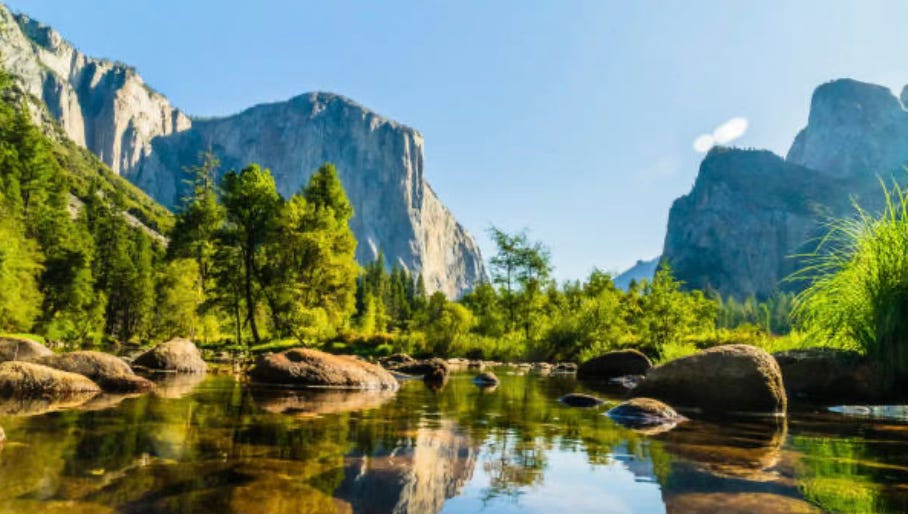"Prosperity Doctrine" Trump's Legacy
A restoration of federalism and respect for state sovereignty is long overdue...
Prescott, AZ, January 8, 2025… Previously, I wrote about what makes a state a state. While through each state's Enabling Act, Congress recognized and admitted them into the union by what is essentially a contract; it does not make a state in and of itself. It is the land within the boundaries set by Congress in the enabling acts that make states what they are. But past Presidents seem to have waved away the Constitutional view of state sovereignty as a neusiance, leaning more to the Hamiltonian view of a superior federal government.
The "Hamiltonian view" of the national government refers to the belief that the federal government should be strong and centralized, with significant power to regulate the economy and national affairs. It advocates for a robust national government that can act decisively on key issues, as championed by Alexander Hamilton during the drafting of the U.S. Constitution. But, while the focus should have been extra-national, the burgeoning federal apparatus turned the focus to domestic affairs. The black letter law memorialized in the Constitution itself is crystal clear.
The Tenth Amendment to the United States Constitution states that powers not given to the federal government are reserved for the states or the people. One of the most basic powers is self-sufficiency. If a state's people are to be self-reliant, they must have control over and access to their natural resources without interference from an overreaching federal government.
The reappearance of what Jarrett Stepman describes in his January 07, 2025, Daily Signal piece on the reappearance of the modern-day Monroe Doctrine frames the president's moves as a Trump 2.0, prosperity-based doctrine. But there is much more to considered than that.
At a Tuesday press conference, which covered a wide range of topics, President-elect Trump announced that his administration would be renaming the Gulf of Mexico the “Gulf of America.”
The once and future president also doubled down on his aims to acquire Greenland, retake control of the Panama Canal, and put pressure on Canada to change its trade relations with the United States.1
Before we acquire more land and potentially create more states in the process, it is critical to get U.S. house of state we already have in order first. The Department of Government Efficiency (DOGE) has a tall order. For those of us in Western states who are forced to live with a bloated, ineffective, and some would say rogue, federal presence, perhaps there is a grand opportunity that is presenting itself.
Take, for example, the BLM. No, not black lives matter; I am talking about the Bureau of Land Management. The BLM describes itself as “10,000 passionate employees work together in a family-friendly environment to find the best use for our public lands. Creating a diverse workforce is important to us at BLM.” I am sure the Bureau is passionate about keeping their jobs and the work that they do. But what exactly is that work? It certainly is not finding the best use for our public lands. They have indeed built a DEI-based special interests-oriented agenda bureau, but for a federal entity that was supposed to be temporary “to dispose of the unappropriated lands to the states,” perhaps it is time to put it out of our misery.
Federal over-reach can be corrected…
Going back to the Roosevelt years—Teddy, not FDR—the federal government has been hostile to state sovereignty, all but ignoring the Tenth Amendment and the very objective of establishing states to reinforce the fabric of what makes America great. While Yosemite is indeed a grand and beautiful display of nature, what was behind the establishment of a national park? Gifford Pinchot, known as the "Father of Forestry," and John Muir were both environmentalists in the late 1800s to early 1900s who wanted to see “public lands” preserved for all Americans to enjoy. Would it not have been just as accessible as a state park?
States east of the Mississippi River have many state parks and forests. I am very familiar with Michigan, for example. The Michigan Department of Natural Resources (DNR) manages 4.6 million acres of State-owned land (21%). Most of these properties are dedicated as State forests, parks, recreation areas, water access sites, and wildlife areas for the public's use and enjoyment and are not available for exclusively private use or sale.2
Moreover, the vast majority of land in Michigan is privately held. This leads to responsible management and beneficial use, the single most key component of prosperity for the people who live on and care for the land. According to available data, approximately 71.9% of land in Michigan is privately held, meaning the majority of the land within the boundaries that define the State of Michigan is owned by private individuals or companies.
Mackinac Island State Park consists of 1,800 acres, Ludington State Park 4,800 acres, and Leelanau State Park 1,550 acres are just a few examples of a state park system. And Michigan seems to get along just fine without BLM interference. There is no BLM managed land in MI. The MIDNR (Michigan Department of Natural Resources) manages State public lands. Why is that? Because when Michigan became a state, the majority of land was properly transferred —disposed of— to the state.
Keep reading with a 7-day free trial
Subscribe to Mark Finchem's Inside Track Substack to keep reading this post and get 7 days of free access to the full post archives.






